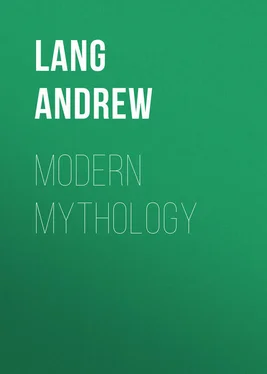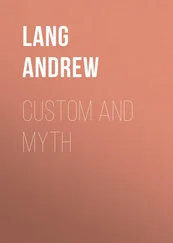Andrew Lang - Modern Mythology
Здесь есть возможность читать онлайн «Andrew Lang - Modern Mythology» — ознакомительный отрывок электронной книги совершенно бесплатно, а после прочтения отрывка купить полную версию. В некоторых случаях можно слушать аудио, скачать через торрент в формате fb2 и присутствует краткое содержание. Жанр: foreign_antique, foreign_prose, на английском языке. Описание произведения, (предисловие) а так же отзывы посетителей доступны на портале библиотеки ЛибКат.
- Название:Modern Mythology
- Автор:
- Жанр:
- Год:неизвестен
- ISBN:нет данных
- Рейтинг книги:4 / 5. Голосов: 1
-
Избранное:Добавить в избранное
- Отзывы:
-
Ваша оценка:
- 80
- 1
- 2
- 3
- 4
- 5
Modern Mythology: краткое содержание, описание и аннотация
Предлагаем к чтению аннотацию, описание, краткое содержание или предисловие (зависит от того, что написал сам автор книги «Modern Mythology»). Если вы не нашли необходимую информацию о книге — напишите в комментариях, мы постараемся отыскать её.
Modern Mythology — читать онлайн ознакомительный отрывок
Ниже представлен текст книги, разбитый по страницам. Система сохранения места последней прочитанной страницы, позволяет с удобством читать онлайн бесплатно книгу «Modern Mythology», без необходимости каждый раз заново искать на чём Вы остановились. Поставьте закладку, и сможете в любой момент перейти на страницу, на которой закончили чтение.
Интервал:
Закладка:
To all this a reply is urged in the following pages. In agreement with Curtius and many other scholars, we very sincerely doubt almost all etymologies of old proper names, even in Greek or Sanskrit. We find among philologists, as a rule, the widest discrepancies of interpretation. Moreover, every name must mean something . Now, whatever the meaning of a name (supposing it to be really ascertained), very little ingenuity is needed to make it indicate one or other aspect of Dawn or Night, of Lightning or Storm, just as the philologist pleases. Then he explains the divine or heroic being denoted by the name – as Dawn or Storm, or Fire or Night, or Twilight or Wind – in accordance with his private taste, easily accommodating the facts of the myth, whatever they may be, to his favourite solution. We rebel against this kind of logic, and persist in studying the myth in itself and in comparison with analogous myths in every accessible language. Certainly, if divine and heroic names – Artemis or Pundjel — can be interpreted, so much is gained. But the myth may be older than the name.
As Mr. Hogarth points out, Alexander has inherited in the remote East the myths of early legendary heroes. We cannot explain these by the analysis of the name of Alexander! Even if the heroic or divine name can be shown to be the original one (which is practically impossible), the meaning of the name helps us little. That Zeus means ‘sky’ cannot conceivably explain scores of details in the very composite legend of Zeus – say, the story of Zeus, Demeter, and the Ram. Moreover, we decline to admit that, if a divine name means ‘swift,’ its bearer must be the wind or the sunlight. Nor, if the name means ‘white,’ is it necessarily a synonym of Dawn, or of Lightning, or of Clear Air, or what not. But a mythologist who makes language and names the fountain of myth will go on insisting that myths can only be studied by people who know the language in which they are told. Mythologists who believe that human nature is the source of myths will go on comparing all myths that are accessible in translations by competent collectors.
Mr. Max Müller says, ‘We seldom find mythology, as it were, in situ – as it lived in the minds and unrestrained utterances of the people. We generally have to study it in the works of mythographers, or in the poems of later generations, when it had long ceased to be living and intelligible.’ The myths of Greece and Rome, in Hyginus or Ovid, ‘are likely to be as misleading as a hortus siccus would be to a botanist if debarred from his rambles through meadows and hedges.’ 3 3 Chips , iv. pp. vi. vii.
Nothing can be more true, or more admirably stated. These remarks are, indeed, the charter, so to speak, of anthropological mythology and of folklore. The old mythologists worked at a hortus siccus , at myths dried and pressed in thoroughly literary books, Greek and Latin. But we now study myths ‘in the unrestrained utterances of the people,’ either of savage tribes or of the European Folk, the unprogressive peasant class. The former, and to some extent the latter, still live in the mythopœic state of mind – regarding bees, for instance, as persons who must be told of a death in the family. Their myths are still not wholly out of concord with their habitual view of a world in which an old woman may become a hare. As soon as learned Jesuits like Père Lafitau began to understand their savage flocks, they said, ‘These men are living in Ovid’s Metamorphoses .’ They found mythology in situ ! Hence mythologists now study mythology in situ – in savages and in peasants, who till very recently were still in the mythopœic stage of thought. Mannhardt made this idea his basis. Mr. Max Müller says, 4 4 Ibid . iv. p. xv.
very naturally, that I have been ‘popularising the often difficult and complicated labours of Mannhardt and others.’ In fact (as is said later), I published all my general conclusions before I had read Mannhardt. Quite independently I could not help seeing that among savages and peasants we had mythology, not in a literary hortus siccus , but in situ . Mannhardt, though he appreciated Dr. Tylor, had made, I think, but few original researches among savage myths and customs. His province was European folklore. What he missed will be indicated in the chapter on ‘The Fire-Walk’ – one example among many.
But this kind of mythology in situ , in ‘the unrestrained utterances of the people,’ Mr. Max Müller tells us, is no province of his. ‘I saw it was hopeless for me to gain a knowledge at first hand of innumerable local legends and customs;’ and it is to be supposed that he distrusted knowledge acquired by collectors: Grimm, Mannhardt, Campbell of Islay, and an army of others. ‘A scholarlike knowledge of Maori or Hottentot mythology’ was also beyond him. We, on the contrary, take our Maori lore from a host of collectors: Taylor, White, Manning (‘The Pakeha Maori’), Tregear, Polack, and many others. From them we flatter ourselves that we get – as from Grimm, Mannhardt, Islay, and the rest – mythology in situ . We compare it with the dry mythologic blossoms of the classical hortus siccus , and with Greek ritual and temple legend, and with Märchen in the scholiasts, and we think the comparisons very illuminating. They have thrown new light on Greek mythology, ritual, mysteries, and religion. This much we think we have already done, though we do not know Maori, and though each of us can hope to gather but few facts from the mouths of living peasants.
Examples of the results of our method will be found in the following pages. Thus, if the myth of the fire-stealer in Greece is explained by misunderstood Greek or Sanskrit words in no way connected with robbery, we shall show that the myth of the theft of fire occurs where no Greek or Sanskrit words were ever spoken. There , we shall show, the myth arose from simple inevitable human ideas. We shall therefore doubt whether in Greece a common human myth had a singular cause – in a ‘disease of language.’
It is with no enthusiasm that I take the opportunity of Mr. Max Müller’s reply to me ‘by name.’ Since Myth , Ritual , and Religion (now out of print, but accessible in the French of M. Marillier) was published, ten years ago, I have left mythology alone. The general method there adopted has been applied in a much more erudite work by Mr. Frazer, The Golden Bough , by Mr. Farnell in Cults of the Greek States , by Mr. Jevons in his Introduction to the History of Religion , by Miss Harrison in explanations of Greek ritual, by Mr. Hartland in The Legend of Perseus , and doubtless by many other writers. How much they excel me in erudition may be seen by comparing Mr. Farnell’s passage on the Bear Artemis 5 5 Cults of the Greek States , ii. 435-440.
with the section on her in this volume.
Mr. Max Müller observes that ‘Mannhardt’s mythological researches have never been fashionable.’ They are now very much in fashion; they greatly inspire Mr. Frazer and Mr. Farnell. ‘They seemed to me, and still seem to me, too exclusive,’ says Mr. Max Müller. 6 6 Chips , iv. p. xiv.
Mannhardt in his second period was indeed chiefly concerned with myths connected, as he held, with agriculture and with tree-worship. Mr. Max Müller, too, has been thought ‘exclusive’ – ‘as teaching,’ he complains, ‘that the whole of mythology is solar.’ That reproach arose, he says, because ‘some of my earliest contributions to comparative mythology were devoted exclusively to the special subject of solar myths.’ 7 7 Chips , iv. p. xiii.
But Mr. Max Müller also mentions his own complaints, of ‘the omnipresent sun and the inevitable dawn appearing in ever so many disguises.’
Интервал:
Закладка:
Похожие книги на «Modern Mythology»
Представляем Вашему вниманию похожие книги на «Modern Mythology» списком для выбора. Мы отобрали схожую по названию и смыслу литературу в надежде предоставить читателям больше вариантов отыскать новые, интересные, ещё непрочитанные произведения.
Обсуждение, отзывы о книге «Modern Mythology» и просто собственные мнения читателей. Оставьте ваши комментарии, напишите, что Вы думаете о произведении, его смысле или главных героях. Укажите что конкретно понравилось, а что нет, и почему Вы так считаете.












